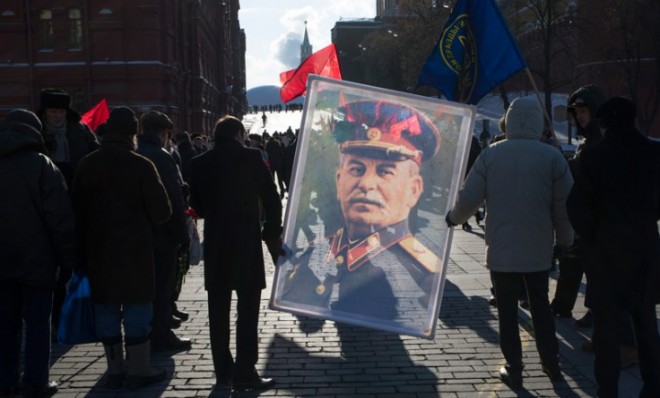Why so many Russians still love Stalin
To the bafflement of the world, Stalin is remembered quite fondly by millions upon millions of Russians

To most of the world, Joseph Stalin, who died 60 years ago today, is a monster — the architect of violent purges and labor camps that killed millions of Russians during his reign over the Soviet Union from 1924 to 1953. So why is Stalin actually more popular in Russia today than he was during the collapse of the Soviet Union in 1991?
It's complicated. Make no mistake; most Russians aren't ignorant of Stalin's crimes. In a recent poll conducted by the Carnegie Endowment for International Peace, 65 percent of Russians agreed that "Stalin was a cruel, inhuman tyrant, responsible for the deaths of millions of innocent people." Yet in 2011, 45 percent of Russians also had a "generally positive" view of Stalin.
A lot of that discrepancy has to do with World War II, or as the Russians call it, the Great Patriotic War. At a recent conference held by the Russian Orthodox Church, which was persecuted by Stalin's government, one speaker told an audience that "the nation must be grateful to Stalin for the 'sacred victory' over Nazi Germany," according to Reuters. Samuel Rachlin, whose Jewish family was exiled from Lithuania to Siberia by the Soviet government, recalls in The New York Times how some of his family's neighbors might have actually been grateful to Stalin, because Lithuania was later invaded by the Nazis. Sixty percent of Russians are in the "at least he's not Hitler" camp, agreeing with the statement that "for all Stalin's mistakes and misdeeds, the most important thing is that under his leadership the Soviet people won the Great Patriotic War."
The Week
Escape your echo chamber. Get the facts behind the news, plus analysis from multiple perspectives.

Sign up for The Week's Free Newsletters
From our morning news briefing to a weekly Good News Newsletter, get the best of The Week delivered directly to your inbox.
From our morning news briefing to a weekly Good News Newsletter, get the best of The Week delivered directly to your inbox.
Some celebrate Stalin as one in a long line of strong Russian leaders, extending back from the Tsars to the inexplicably shirtless Vladimir Putin. Others have even more bizarre reasons for admiring him:
A surprisingly large number of Russians even believe that Stalin had mystical powers. As recently as 2003, about 750,000 people voted for a party that aimed to continue what it said was Stalin's attempt to battle the ancient Egyptian priesthood of Ra, which supposedly runs the world from its base in Switzerland. [Associated Press]
In Georgia, they have a more traditional reason for liking Stalin: He was born there. The Carnegie poll found that 68 percent of Georgians agreed that "Stalin was a wise leader who brought the Soviet Union to might and prosperity." According to the BBC, his birthplace of Gori features a Stalin museum and has voted to erect a huge statue of the dictator. One tour guide summed up the country's feelings towards the man:
In Georgia, most of the old generation like Stalin. They think he was a great statesman, with his small mistakes. Young people don't like Stalin, of course. Our young people are not interested in history and they don't like Stalin. [BBC]
That brings up an important point: Young people in Russia don't really think much of anything about Stalin. The Carnegie poll found that 18- to 24-year-olds were "almost twice as likely not to care about Stalin one way or another" as those who were 55 or older. Lev Kudkov, one of the authors of the study, is troubled by a population that feels increasingly positive or indifferent about Stalin, mainly because another Russian strongman might be learning lessons from him:
Vladimir Putin's Russia of 2012 needs symbols of authority and national strength, however controversial they may be, to validate the newly authoritarian political order. Stalin, a despotic leader responsible for mass bloodshed but also still identified with wartime victory and national unity, fits this need for symbols that reinforce the current political ideology. [Carnegie]
As another author of the Carnegie report, Maria Lipman, gracefully points out, despite being buried in Moscow, "Stalin is not dead."
A free daily email with the biggest news stories of the day – and the best features from TheWeek.com
Keith Wagstaff is a staff writer at TheWeek.com covering politics and current events. He has previously written for such publications as TIME, Details, VICE, and the Village Voice.
-
 The Night Manager series two: ‘irresistible’ follow-up is ‘smart, compelling’ TV
The Night Manager series two: ‘irresistible’ follow-up is ‘smart, compelling’ TVThe Week Recommends Second instalment of the spy thriller keeps its ‘pace’, ‘intrigue’ and ‘sly sexiness’
-
 11 hotels opening in 2026 to help you reconnect with nature
11 hotels opening in 2026 to help you reconnect with natureThe Week Recommends Find peace on the beaches of Mexico and on a remote Estonian island
-
 Zimbabwe’s driving crisis
Zimbabwe’s driving crisisUnder the Radar Southern African nation is experiencing a ‘public health disaster’ with one of the highest road fatality rates in the world
-
 Bari Weiss’ ‘60 Minutes’ scandal is about more than one report
Bari Weiss’ ‘60 Minutes’ scandal is about more than one reportIN THE SPOTLIGHT By blocking an approved segment on a controversial prison holding US deportees in El Salvador, the editor-in-chief of CBS News has become the main story
-
 Has Zohran Mamdani shown the Democrats how to win again?
Has Zohran Mamdani shown the Democrats how to win again?Today’s Big Question New York City mayoral election touted as victory for left-wing populists but moderate centrist wins elsewhere present more complex path for Democratic Party
-
 Millions turn out for anti-Trump ‘No Kings’ rallies
Millions turn out for anti-Trump ‘No Kings’ ralliesSpeed Read An estimated 7 million people participated, 2 million more than at the first ‘No Kings’ protest in June
-
 Ghislaine Maxwell: angling for a Trump pardon
Ghislaine Maxwell: angling for a Trump pardonTalking Point Convicted sex trafficker's testimony could shed new light on president's links to Jeffrey Epstein
-
 The last words and final moments of 40 presidents
The last words and final moments of 40 presidentsThe Explainer Some are eloquent quotes worthy of the holders of the highest office in the nation, and others... aren't
-
 The JFK files: the truth at last?
The JFK files: the truth at last?In The Spotlight More than 64,000 previously classified documents relating the 1963 assassination of John F. Kennedy have been released by the Trump administration
-
 'Seriously, not literally': how should the world take Donald Trump?
'Seriously, not literally': how should the world take Donald Trump?Today's big question White House rhetoric and reality look likely to become increasingly blurred
-
 Will Trump's 'madman' strategy pay off?
Will Trump's 'madman' strategy pay off?Today's Big Question Incoming US president likes to seem unpredictable but, this time round, world leaders could be wise to his playbook